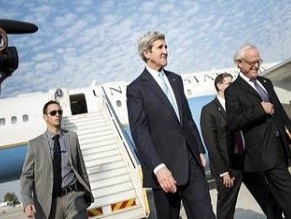|
World Jewish News

US Secretary of State Kerry and envoy Martin Indyk arrive Photo: Reuters
|
Israeli officials: 'Zero chance' for peace talks to break impasse before end of April
11.04.2014, Israel and the World There are "zero chances" for Israel and the Palestinians to reach an agreement to overcome the current crisis in talks before their April 29 deadline, unnamed Israeli officials said Friday.
The officials told Channel 10 that the departure of US envoy Martin Indyk, who left the region for Passover break, along with Israel's alleged imposition of new economic sanctions on the Palestinian Authority were signs that the deadlock would not be eased in the coming weeks.
On Thursday, Israeli and Palestinian officials held their fourth session in a week to find a way out of the current impasse in the talks. The sides did not reach an agreement, but sources familiar with their discussions said they did agree to continue meeting in the days ahead.
The sources’ comments came amid reports coming from Cairo – where Palestinian Authority President Mahmoud Abbas met with Arab League officials – that there was a breakthrough in the talks that would enable a continuation of the talks past the April 29 deadline.
One Israeli source familiar with the talks denied that there was any breakthrough, saying the sides were “still stuck and not out of the crisis.”
He said, however, that the sides were “continuing to talk to see if it is possible to find a way out.”
In the meantime, a government official said that Israel had decided to deduct from the approximately NIS 400m. in tax revenues it collects and transfers to the Palestinian Authority each month, to cover the money that the PA owes Israel, primarily for electricity and hospital costs.
These debts are estimated to be about NIS 200m. In addition, it was decided to stop Israel’s involvement in the development of the Gaza Marine gas field.
The official said these moves were taken in response to the Palestinians’ unilateral application to join 15 international treaties and conventions.
Israel, one official said, was still mulling whether to also deduct from the sums transferred to the PA the amount of money the PA pays each year to terrorists serving time in Israeli prisons and their families, as well as to the families of dead terrorists.
In Washington, meanwhile, State Department spokeswoman Jen Psaki said that “both parties remain in intensive negotiations.” The gaps were “narrowing,” but any speculation on an agreement was premature, she said.
Psaki said that US envoy Martin Indyk, in the center of efforts to reach an agreement, would return to Washington for consultation, and would return to the region next week.
Prime Minister Binyamin Netanyahu met on Thursday with Ed Miliband, the Jewish leader of the British Labor Party.
Both men refrained from talking to reporters, but Miliband, speaking to students at the Hebrew University of Jerusalem, said he supported US Secretary of State John Kerry’s efforts to reach a peace deal.
“We want to encourage the two-state solution that we in the Labor Party believe in,” Miliband said. “All our efforts must be put into this [Israeli-Palestinian] dialogue carrying on and getting to a fruitful outcome.”
According to a Channel 2 report, the package deal that was on the table last week was still on the table now, though in a somewhat modified form.
Under that package, scuttled when the Palestinians applied to join the 15 international treaties and conventions, Israel would release the fourth batch of 26 Palestinian prisoners convicted of terrorist acts before the 1993 Oslo Accords, along with hundreds of additional prisoners without “blood on their hands,” and agree to “restrain” settlement construction in Judea and Samaria.
In return, the Palestinians would commit to continue the talks until the end of January 2015 and would refrain from applying for admittance into additional international organizations, treaties and conventions. In addition, the US would release Israeli spy Jonathan Pollard.
On Wednesday, UN Secretary-General Ban Ki-moon began processing the Palestinian applications to 10 UN organizations and treaties, and the Swiss Foreign Ministry on Thursday accepted the Palestinian application to join the Fourth Geneva Convention.
One issue reportedly being discussed by the sides was the status of these applications, and whether they would – or could – be withdrawn. Foreign Minister Avigdor Liberman has said he would only support a deal if those applications were withdrawn.
There is some speculation that if only some of the applications were withdrawn, then Israeli would release fewer Palestinian prisoners “without blood on their hands” than initially intended.
Meanwhile, a senior PLO official on Thursday denied that Abbas had already agreed to the extension of the talks. Wasel Abu Yusef, a member of the PLO Executive Committee, said that the PA leadership has not yet met to discuss the possibility of extending the talks past April 29.
Foreign Minister Riad Malki said that the PA leadership has demanded the release of the fourth and final batch of Palestinian prisoners and a full cessation of settlement construction as a precondition for pursuing the talks with Israel. He told the Voice of Palestine radio station that the PA leadership has also demanded that the two sides draw the borders of a future Palestinian state before agreeing to extend the negotiations.
Malki said that the Palestinians were waiting for Israel’s response to the demands. He warned that Israeli failure to comply would prompt the Palestinians to consider applying for membership in additional international groups.
By JPOST.COM STAFF, HERB KEINON, KHALED ABU TOAMEH
JPost.com
|
|
